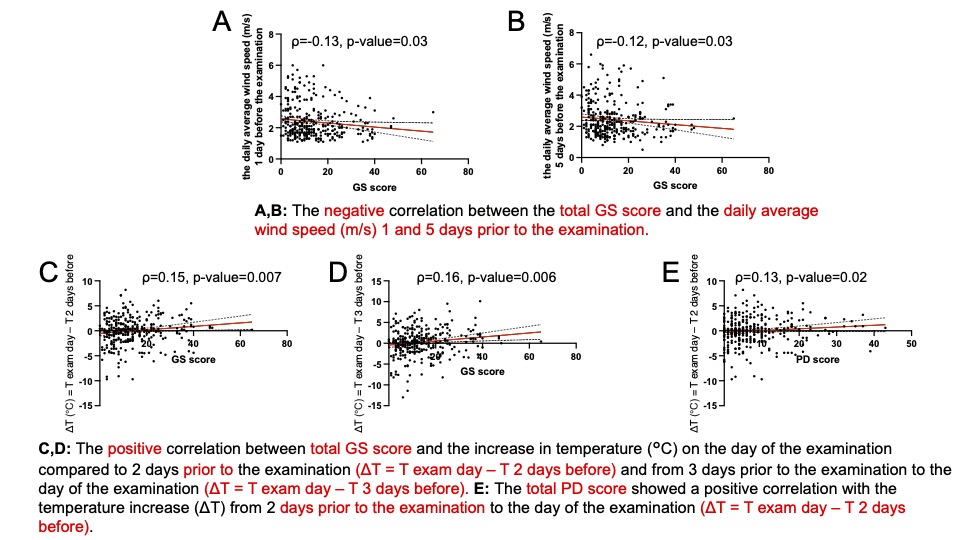Session Information
Date: Sunday, November 12, 2023
Title: (0380–0422) RA – Diagnosis, Manifestations, and Outcomes Poster I
Session Type: Poster Session A
Session Time: 9:00AM-11:00AM
Background/Purpose: Various environmental factors are involved in the pathogenesis of rheumatoid arthritis (RA), and meteorological conditions such as temperature and atmospheric pressure have also been reported to affect its symptoms. However, studies evaluating its influence based on objective imaging studies are lacking. This study analyzed the correlation between joint ultrasonography scores and meteorological conditions in a multicenter RA cohort to determine whether meteorological conditions contribute to the joint ultrasound findings of RA.
Methods: The present study was analyzed from the baseline data from Kyushu Multicenter Rheumatoid Arthritis Ultrasound Prospective Observational Cohort started from 2013. This cohort study recruits active RA patients who require the treatment with biologicalor targeted synthetic disease-modifying anti-rheumatic drugs (b/tsDMARDs). Three hundred eight subjects were evaluated by joint ultrasound synovitis scores [22 joints including bilateral 1st -5th metacarpophalangeal (MCP) joints, proximal interphalangeal (PIP) joints, and wrist joints semi-quantitatively examined by grey-scale (GS) and power Doppler (PD) scores from 0 to 3]. The sum of the GS and PD scores was used as an indicator of individual’s ultrasound disease activity. Metrological data [daily mean temperature (°C), daily mean-sea-level barometric pressure (hPa), daily mean vapor pressure (hPa), and daily mean wind speed (m/s)] was obtained from the database issued by the Japan Meteorological Agency (JMA). Spearman’s rank correlation coefficient was used for the analysis of the correlation between metrological conditions and ultrasonographic scores.
Results: There was a negative correlation between the total GS score and the daily average wind speed 1 and 5 days before the examination (ρ=-0.13, p-value=0.03, andρ=-0.12, p-value=0.03, respectively). The total GS score exhibited a positive correlation with the increase in temperature on the day of the examination compared to 2 days prior to the examination(ΔT = T exam day–T 2 days before,ρ=0.15, p-value=0.007) and from 3 days prior to the examination to the day of the examination(ΔT = T exam day–T 3 days before,ρ=0.16, p-value=0.006). The total PD score showed a positive correlation with the temperature increase (ΔT) from 2 days prior to the examination to the day of the examination(ΔT = T exam day–T 2 days before,ρ=0.13, p-value=0.02).
Conclusion: Our findings suggest that meteorological conditions, specifically low wind speed, and temperature rise, are associated with the joint ultrasound findings of RA patients. Understanding these correlations could aid in better management and treatment of RA by considering the potential climate impact toward RA disease conditions. Further research and studies are warranted to explore the underlying mechanisms and to validate these findings in larger and more diverse cohorts.
To cite this abstract in AMA style:
Umeda M, Endo Y, Michitsuji T, Nishino A, Kawashiri S, Morimoto S, Tuboi M, Matsuoka N, Fujikawa K, Mizokami A, Arinobu Y, Tsuru T, Takaoka H, Yoshitama T, Asano T, Ishizaki J, Kawakami A. Meteorological Conditions Contribute to the Joint Ultrasound Findings in Patients with Rheumatoid Arthritis: Kyushu Multicenter Rheumatoid Arthritis Ultrasound Prospective Observational Cohort Study [abstract]. Arthritis Rheumatol. 2023; 75 (suppl 9). https://acrabstracts.org/abstract/meteorological-conditions-contribute-to-the-joint-ultrasound-findings-in-patients-with-rheumatoid-arthritis-kyushu-multicenter-rheumatoid-arthritis-ultrasound-prospective-observational-cohort-study/. Accessed .« Back to ACR Convergence 2023
ACR Meeting Abstracts - https://acrabstracts.org/abstract/meteorological-conditions-contribute-to-the-joint-ultrasound-findings-in-patients-with-rheumatoid-arthritis-kyushu-multicenter-rheumatoid-arthritis-ultrasound-prospective-observational-cohort-study/

